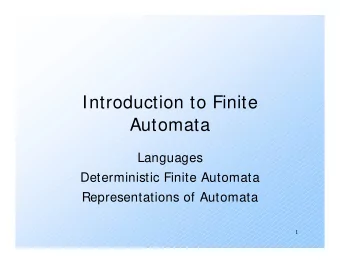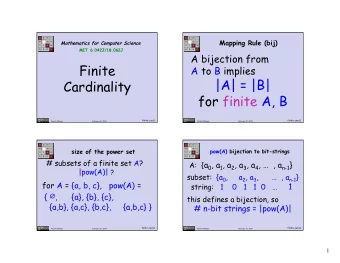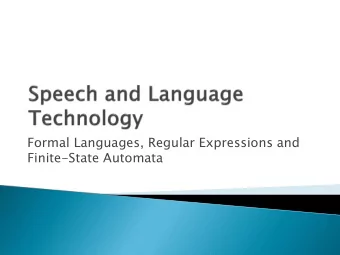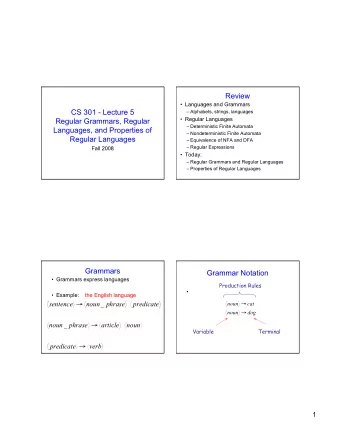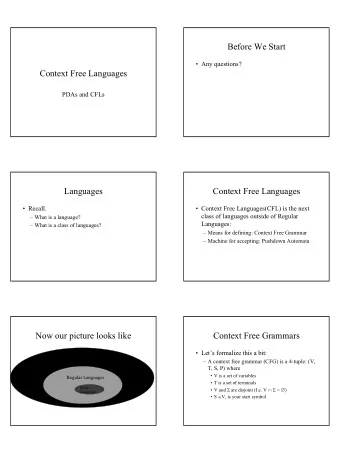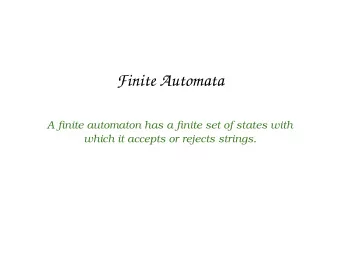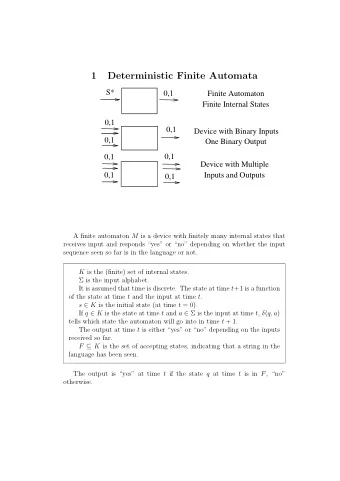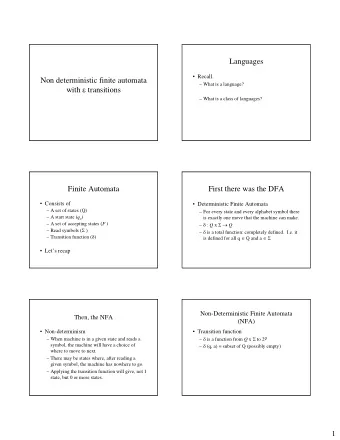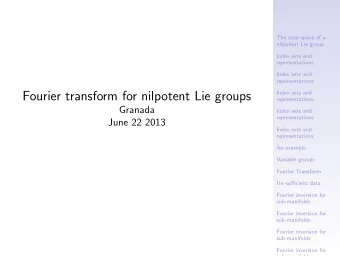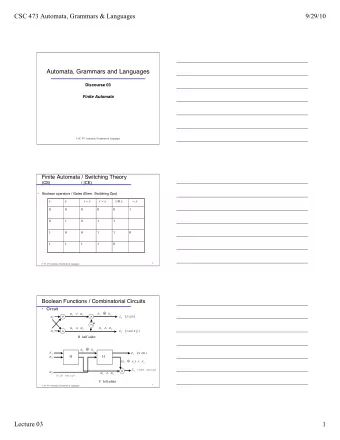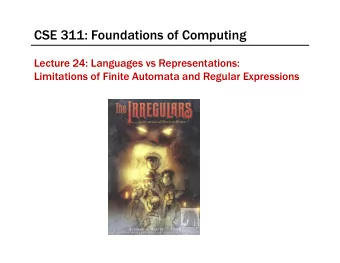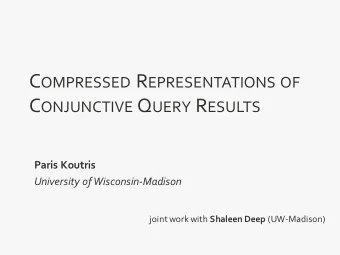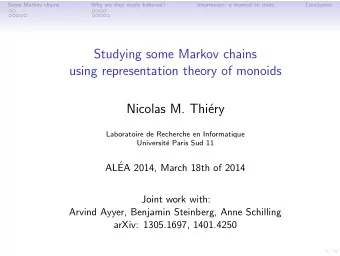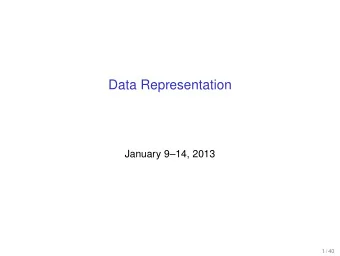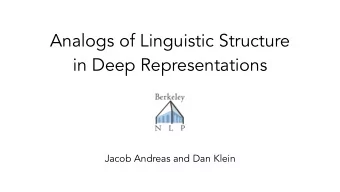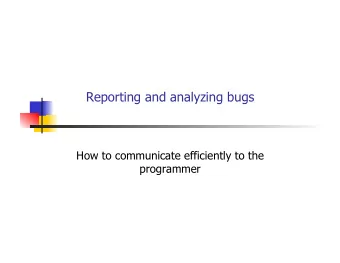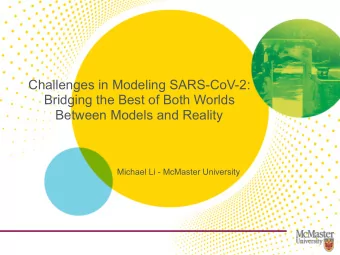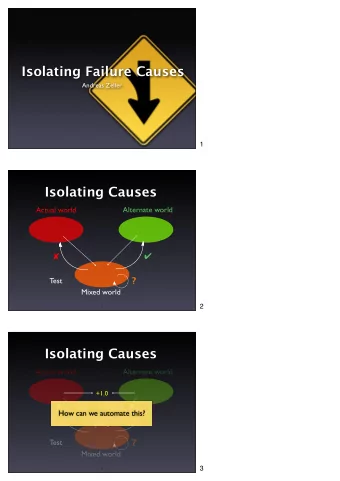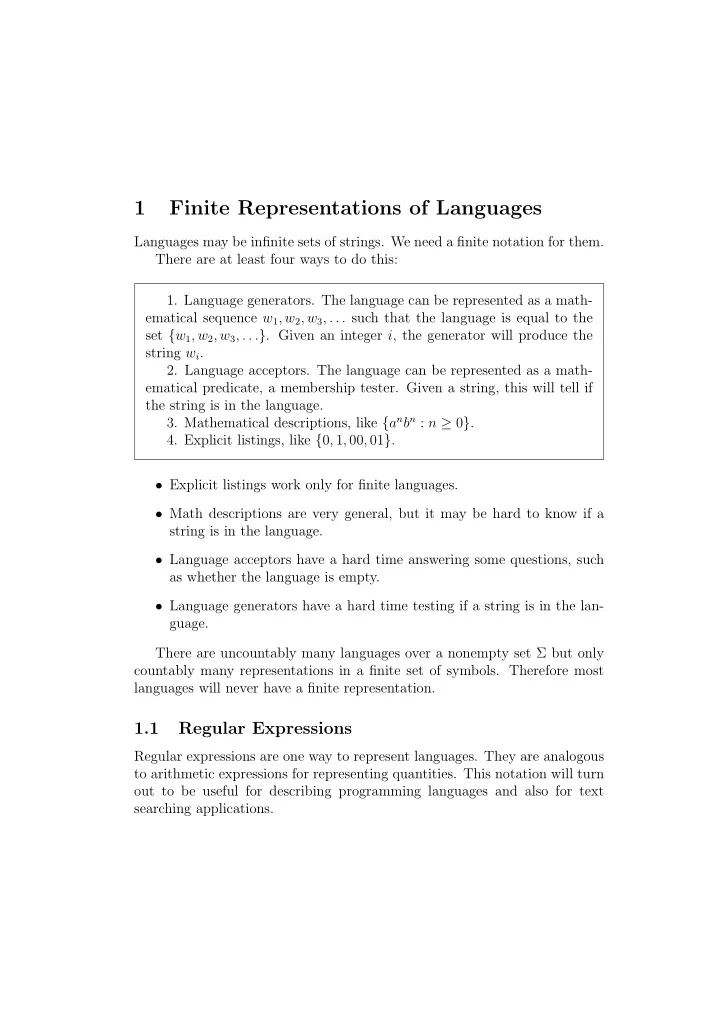
1 Finite Representations of Languages Languages may be infinite - PDF document
1 Finite Representations of Languages Languages may be infinite sets of strings. We need a finite notation for them. There are at least four ways to do this: 1. Language generators. The language can be represented as a math- ematical sequence w
1 Finite Representations of Languages Languages may be infinite sets of strings. We need a finite notation for them. There are at least four ways to do this: 1. Language generators. The language can be represented as a math- ematical sequence w 1 , w 2 , w 3 , . . . such that the language is equal to the set { w 1 , w 2 , w 3 , . . . } . Given an integer i , the generator will produce the string w i . 2. Language acceptors. The language can be represented as a math- ematical predicate, a membership tester. Given a string, this will tell if the string is in the language. 3. Mathematical descriptions, like { a n b n : n ≥ 0 } . 4. Explicit listings, like { 0 , 1 , 00 , 01 } . • Explicit listings work only for finite languages. • Math descriptions are very general, but it may be hard to know if a string is in the language. • Language acceptors have a hard time answering some questions, such as whether the language is empty. • Language generators have a hard time testing if a string is in the lan- guage. There are uncountably many languages over a nonempty set Σ but only countably many representations in a finite set of symbols. Therefore most languages will never have a finite representation. 1.1 Regular Expressions Regular expressions are one way to represent languages. They are analogous to arithmetic expressions for representing quantities. This notation will turn out to be useful for describing programming languages and also for text searching applications.
There are rules of inference for constructing regular expressions over an alphabet Σ. 1. If a ∈ Σ then a itself is a regular expression over Σ. 2. ∅ is a regular expression over Σ. 3. If E and F are regular expressions over Σ then so is ( EF ). 4. If E and F are regular expressions over Σ then so is ( E ∪ F ). 5. If E is a regular expression over Σ then so is ( E ∗ ). 6. Parentheses can often be omitted. Example: Suppose Σ = { 0 , 1 } . Then 0 is a regular expression over { 0 , 1 } by 1. So (0 ∗ ) is a regular expression over { 0 , 1 } by 5. Also, 1 is a regular expression over { 0 , 1 } by 1. So 1(0 ∗ ) is a regular expression over { 0 , 1 } by 3. Also (1 ∗ ) is a regular expression over { 0 , 1 } by 5. So 0(1 ∗ ) is a regular expression over { 0 , 1 } by 3. Thus 1(0 ∗ ) ∪ 0(1 ∗ ) is a regular expression over { 0 , 1 } by 4. This regular expression represents the language ( { 1 }{ 0 } ∗ ) ∪ ( { 0 }{ 1 } ∗ ). This language contains strings like { 1 , 10 , 100 , 1000 , . . . , 0 , 01 , 011 , 0111 , . . . } . Note that { 0 , 1 } ∗ is not a regular expression over the alphabet { 0 , 1 } . 1.2 Language Represented by a Regular Expression If E is a regular expression then let L ( E ) be the language it represents. We have the following rules: If a ∈ Σ then L ( a ) = { a } . L ( ∅ ) = ∅ L ( EF ) = L ( E ) ◦ L ( F ) L ( E ∪ F ) = L ( E ) ∪ L ( F ) L ( E ∗ ) = L ( E ) ∗
Note that L ( E ) ◦L ( F ) is the concatenation of two languages, L ( E ) ∪L ( F ) is the union of two languages, and L ( E ) ∗ is the Kleene star of a language. Thus for example L (1(0 ∗ ) ∪ 0(1 ∗ )) = L (1(0 ∗ )) ∪ L (0(1 ∗ )) = ( L (1) ◦ L (0 ∗ )) ∪ ( L (0) ◦ L (1 ∗ )) = ( { 1 } ◦ { 0 } ∗ ) ∪ ( { 0 } ◦ { 1 } ∗ ) . 1.3 Regular Languages A language L is said to be regular if there is a regular expression E such that L = L ( E ), that is, if L can be represented by a regular expression. Natural questions: Which languages can be represented by regular ex- pressions? Is every language regular? Is { a n b n : n ≥ 0 } regular? If L 1 and L 2 are regular, are L 1 ∩ L 2 , L 1 − L 2 , L 1 ∪ L 2 , et cetera? How can one generate a regular expression for a set S of strings? To do this, (a) split S into subsets that are easier to describe, (b) find a regular expression for each subset, then (c) take their union. 1.4 Equations Between Languages Facts: { a, b } ∗ � = { a } ∗ { b } ∗ { a } ∗ { b } ∗ � = { a } ∗ ∪ { b } ∗ L ( ∅ ∗ ) = { ǫ } We write E = F as regular expressions if L ( E ) = L ( F ). Facts: ab ∅ = ∅
ab ( ∅ ∗ ) = ab To simplify a regular expression E means to find a simpler regular ex- pression F such that E = F . In general how can one simplify a regular expression? To do this, (a) list some strings in the regular expression, (b) try to find a pattern in these strings, and (c) find a simpler regular expression for this pattern. Note again that { 0 , 1 } ∗ is not a regular expression over the alphabet { 0 , 1 } . Regular expressions do not contain any braces ( { , } ) or commas unless these symbols are in the alphabet. 1.5 Problems Give a regular expression for the set of even length binary strings. Problem 1.8.1: What language is represented by the regular expression ((( a ∗ a ) b ) ∪ b )? Can you find a simpler expression for it? Problem: Find a regular expression for the set of strings in { a, b } ∗ that have exactly one a in them. Problem: Find a regular expression for the set of strings in { a, b, c } ∗ that have exactly one a or exactly one b in them. Problem: Try to find a regular expression for the set of valid floating point numbers, things such as 0.326E+5. You can use D to represent the digits { 0 , 1 , 2 . 3 , 4 , 5 , 6 , 7 , 8 , 9 } . 1.6 Regular Expressions in Languages Look at web links on regular expressions in various programming languages. • Regular Expressions in Perl • Unix Grep Utility • Mastering Regular Expressions • A Tao of Regular Expressions • Wikipedia Article; Standards for Regular Expressions Distinguish text searching from regular expressions Searching for ca ∗ in bbcaab will succeed but bbcaab �∈ L ( ca ∗ ). How to simulate ? with regular expressions Protein Sequence Similarity – Explain BLAST
1.7 Finite Automata Introduction • Fixed memory can be an advantage. Makes storage allocation and caching easier. • A stack helps a little for memory allocation –can predict where accesses will be Related Subjects • Hidden Markov Model. Similar to finite automata but with probabili- ties attached to the transitions and also give outputs. • Cellular Automata. Arrays of automata that interact with each other. • B¨ uchi Automata: Operate on infinite strings. Used for model checking. Accept if some accepting state is visited infinitely often.
Recommend
More recommend
Explore More Topics
Stay informed with curated content and fresh updates.
